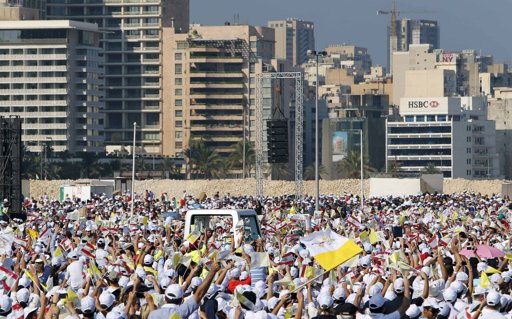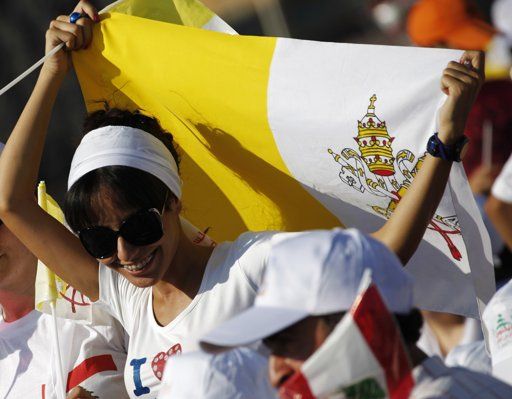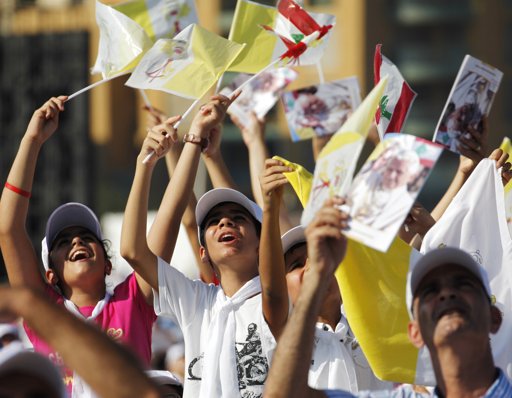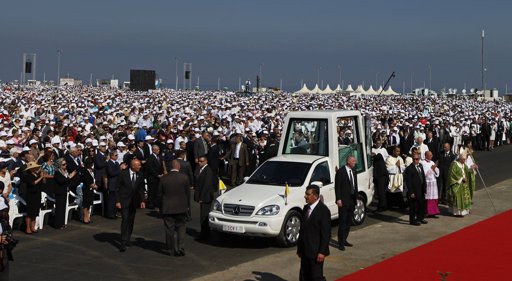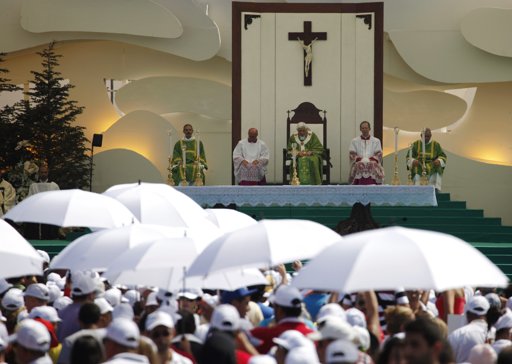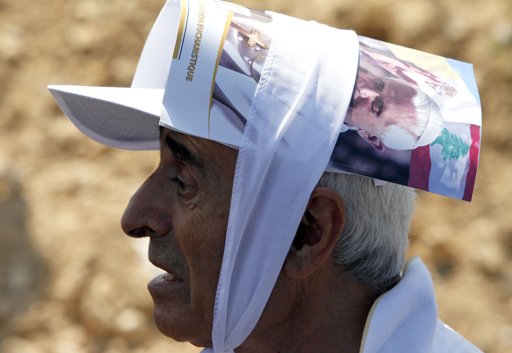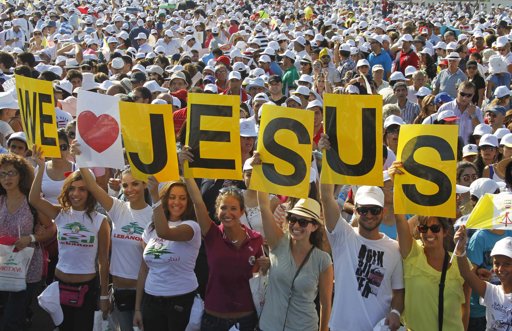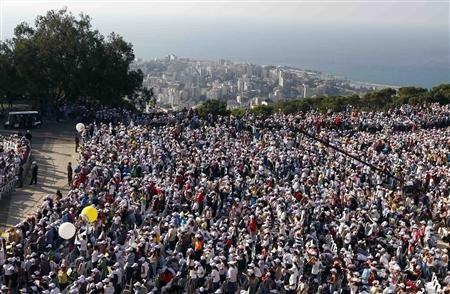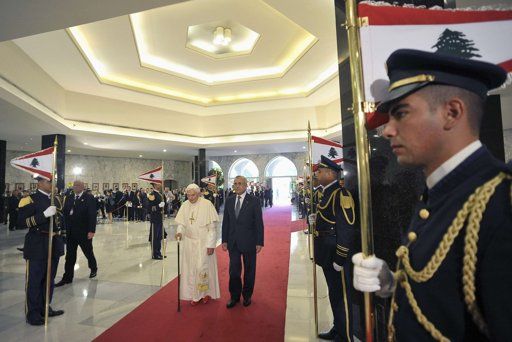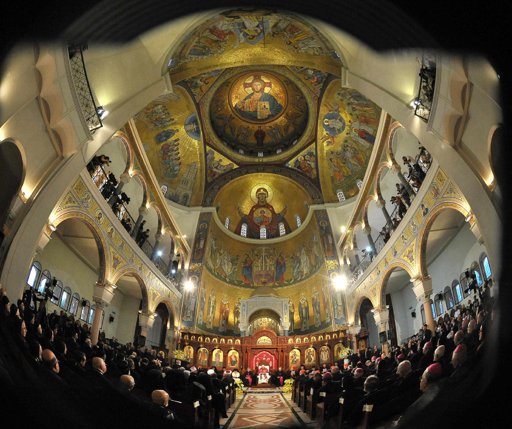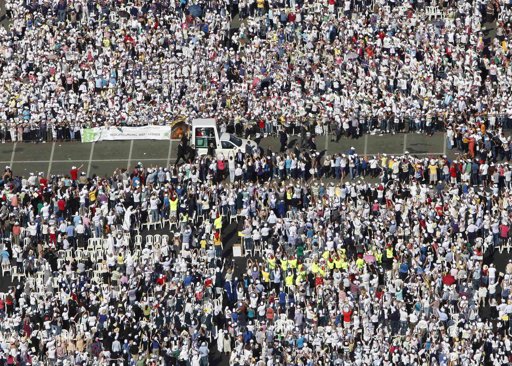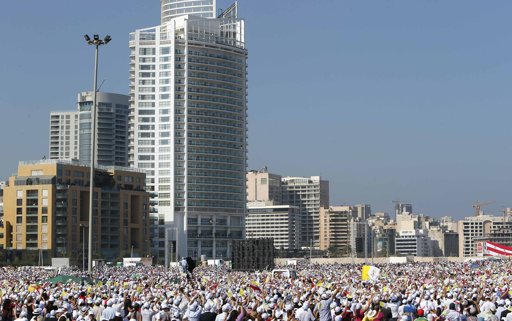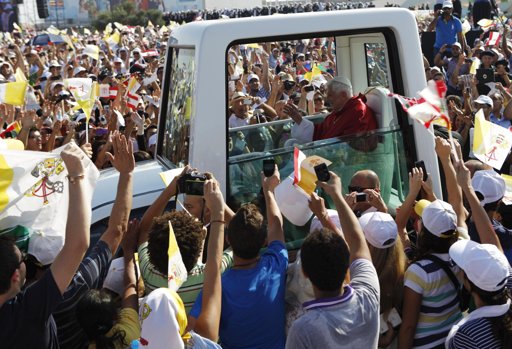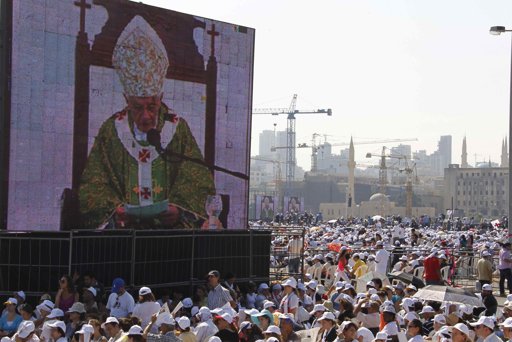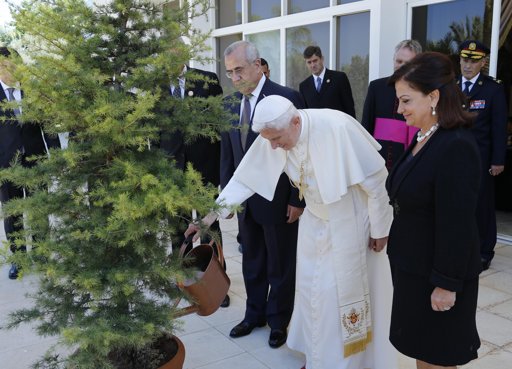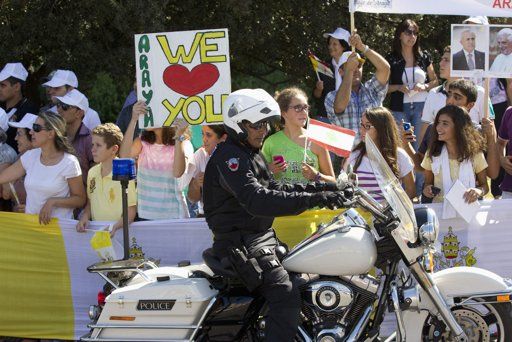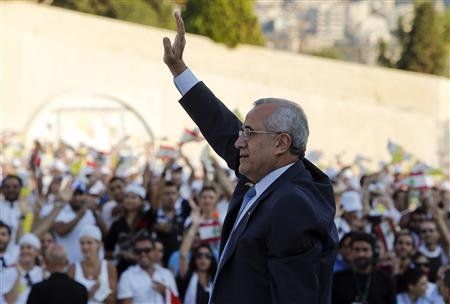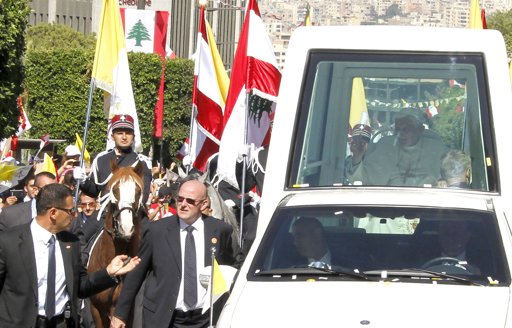Cardinal Joseph Ratzinger, Pope Benedict XVI, was born at Marktl am Inn, Diocese of Passau (Germany) on 16 April 1927 (Holy …
Pope Benedict XVI appealed to Christians, Jews and Muslims alike to "root out" religious fundamentalism, as deadly unrest sweeps the …
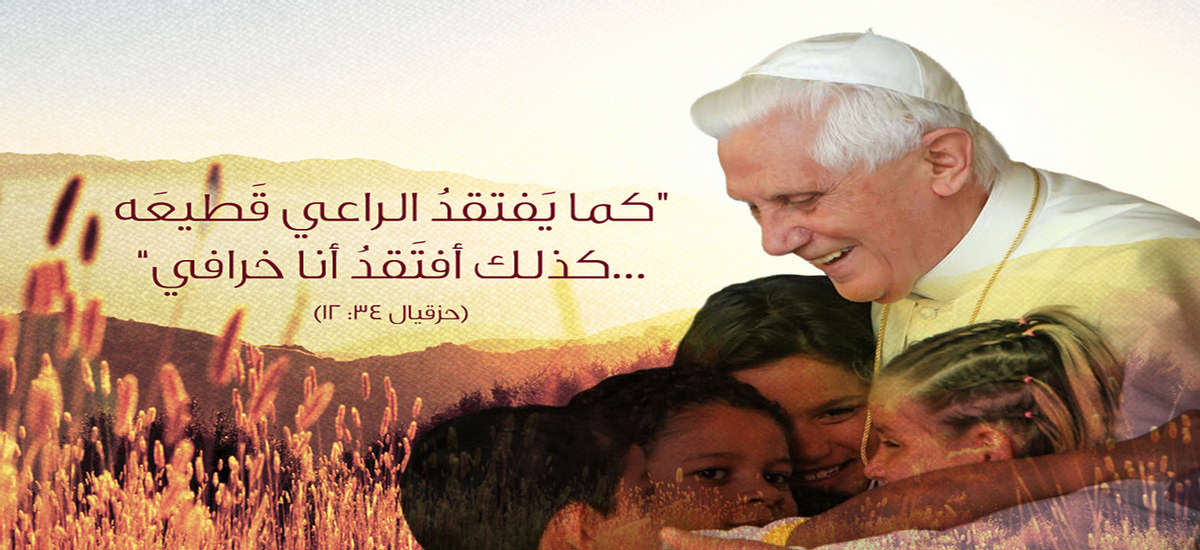
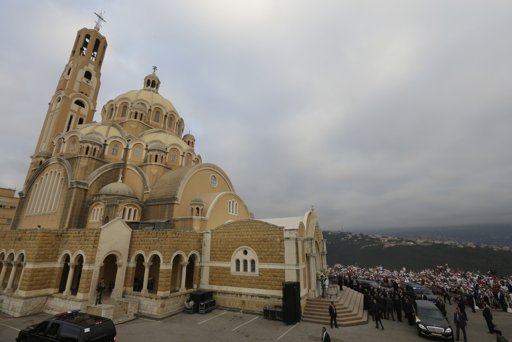
The convoy of Pope Benedict XVI, right, arrives at St. Paul's Basilica to sign the post-Synodal Apostolic Exhortation of the special assembly for the Middle East of the Synod of Bishops, in Harissa
Pope signs momentous document on Church in the Middle East
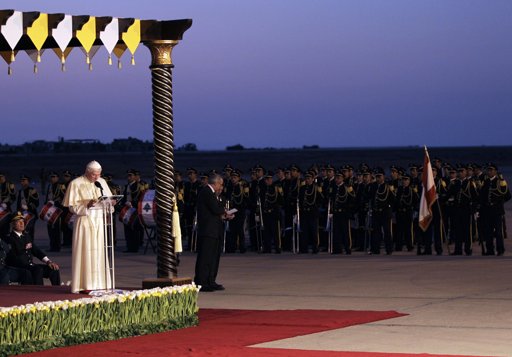
Pope Benedict XVI, left, addresses a speech in front of Lebanese honor guards during his
An aerial view of the waterfront where a mass is being held by Pope Benedict XVI in Beirut
Pope Benedict waves from his Pope-mobile upon his arrival to conduct an open-air mass
The faithful holds a Vatican flag during an open air mass conducted by Pope Benedict
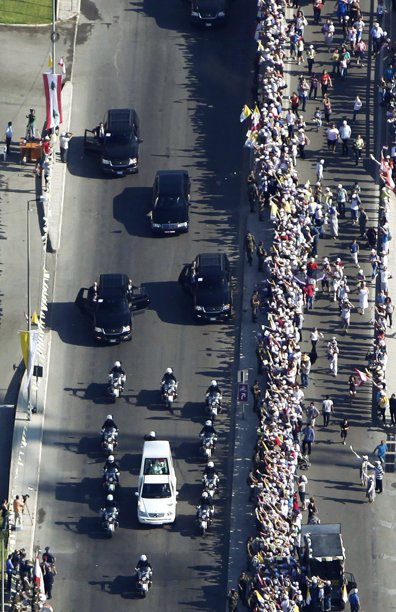
Pope Benedict disembarks from Pope-mobile to conduct an open-air mass service at Beirut
Pope Benedict XVI conducts an open air mass service as faithfuls use umbrella
Faithful gather at Bkerke in Harissa near Beirut before the Pope Benedict XVI meets the youth September 15, 2012. REUTERS/ Stefano Rellandini
Pope Benedict XVI walks next to Lebanon's President Suleiman as he arrives at Baabda Pres.
Pope Benedict XVI and Gregorios III, Patriarch of the Church of Antioch, attend a ceremon...
Pope Benedict XVI waves to faithfuls from his pope-mobile upon his arrival to conduct an open air mass service at Beirut City Centre Waterfront,
Pope Benedict XVI arrives at the waterfront of Beirut where he will lead a mass
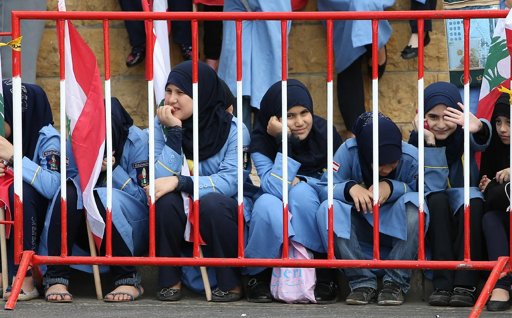
Hezbollah Al-Mahdi girl-scouts wait outside Rafik Hariri international airport to welcome the Pope Benedict XVI, in Beirut
Pope Benedict conducts an open air mass at Beirut City Centre Waterfront
Pope Benedict XVI has signed his Post-Synodal Apostolic Exhortation on the Church in the Middle East, “Ecclesia in Medio Oriente,” during the first day of his visit to Lebanon. “The Exhortation as a whole is meant to help each of the Lord’s disciples to live fully and to pass on faithfully to others what he or she has become by Baptism: a child of light, sharing in God’s own light, a lamp newly lit amid the troubled darkness of this world, so that the light may shine in the darkness,” he said. Pope Benedict made his remarks during the official signing ceremony at the Melkite Greek Catholic Basilica of St. Paul in the coastal town of Harissa, Sept. 14. “The document seeks to help purify the faith from all that disfigures it, from everything that can obscure the splendor of Christ’s light,” he noted. “For communion is true fidelity to Christ, and Christian witness is the radiance of the paschal mystery which gives full meaning to the cross, exalted and glorious.” The exhortation is the Pope’s response to the deliberations of the Synod of Bishops of the Middle East held at the Vatican in October 2010. The topic for discussion then was “The Catholic Church in the Middle East: Communion and Witness.” “Churches of the Middle East, fear not, for the Lord is truly with you, to the close of the age!” urged Pope Benedict, “Fear ot, because the universal Church walks at your side and is humanly and spiritually close to you!”
Pope Benedict XVI waters a Cedar tree as Lebanon's President Michel Suleiman and his wife Wafaa (R) watch him at Baabda Presidential Palace near Beirut,
Pope Benedict XVI waves as he arrives for a meeting with youths in Bkerke in Harissa,
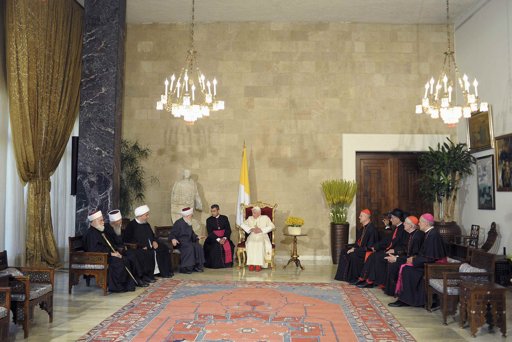
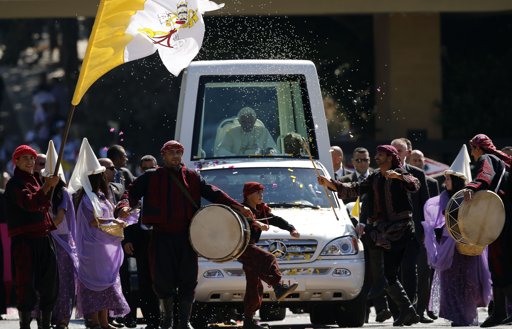
Pope Benedict XVI greets children welcoming his arrival at Baabda Presidential Palace near Beirut, as Lebanon's President Michel Suleiman and his wife Wafaa (R) watch September 15, 2012. Pope Benedict.
Pope Benedict XVI greets faithful from his Pope Mobile as he is surrounded by bodyguards
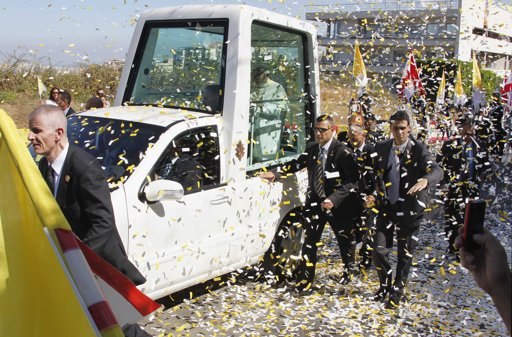

Bodyguards escort the Pope Benedict XVI greeting faithful from his Pope Mobile,
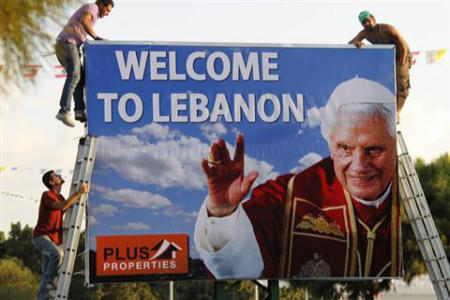
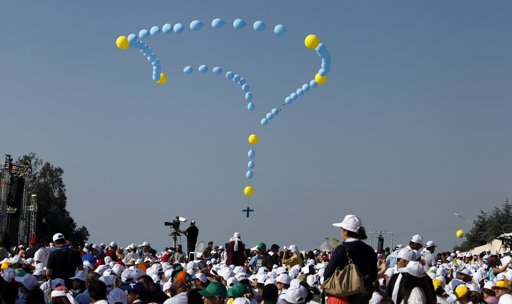
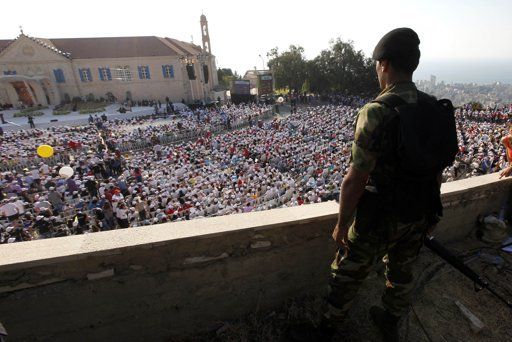
The Patriarch claimed that the Muslim community was "very enthusiastic about the Pope's visit" and expressed his belief that "the Pope will help bring the dawn of peace to the region." And that the "real Arab Spring will arrive as the fruit of a Christian Spring and we can help to achieve this through communion and witness to love".
Pope Benedict XVI attends the St. Paul basilic in Beirut

Pope Benedict XVI is welcomed by Lebanon's President Suleiman upon his arrival at Beirut'..

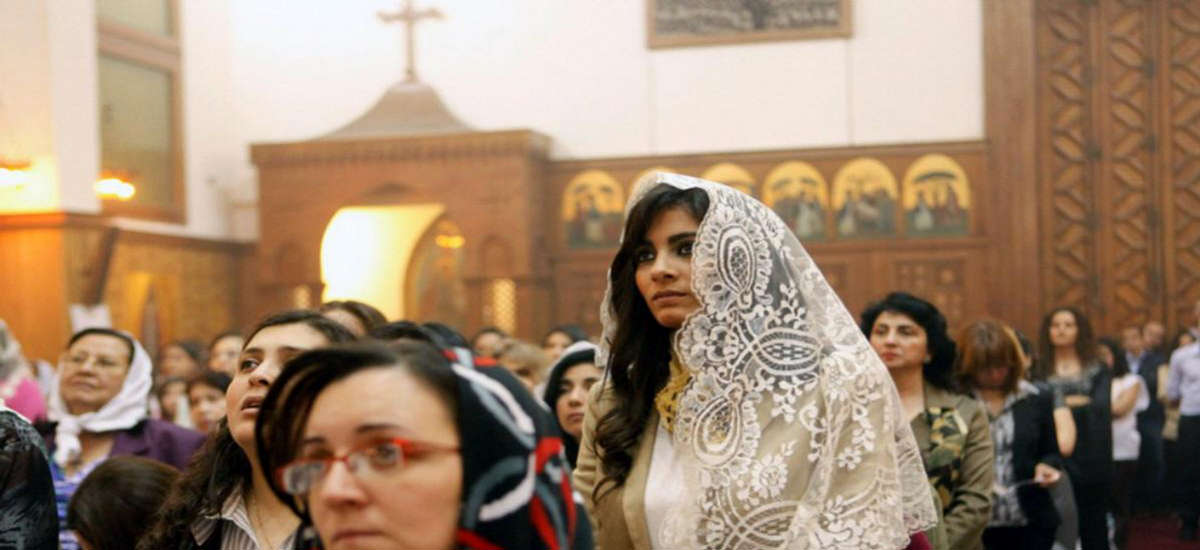
As a former tour guide on Nile cruise boats and now a professor of religious studies at Santa Clara University in California, David Pinault is no stranger to the Middle East. He was there during the demonstrations in Tahrir Square in January 2011. He recently went back again and wrote an article, "Ready To Be Martyrs." It offers us a unique perspective from which all Christians can learn.
KNOXVILLE, TN (Catholic Online) - As a former tour guide on Nile cruise boats and now a professor of religious studies at Santa Clara University in California, David Pinault is no stranger to the Middle East. He was there during the demonstrations in Tahrir Square in January 2011. He recently went back again and wrote an article, "Ready To Be Martyrs." It offers us a unique perspective from which all Christians can learn.
According to his article, two things stood out for Pinault on his most recent trip to Egypt: the modern-day martyrdom of Christians in Egypt and the Egyptian heritage of the Coptic Christian community. He recalls his driver in Cairo, a Copt by the name of Sami, telling him about the persecution of the Copts by Islamists since the demonstrations in 2011. Islamists want an Islamist government with sharia law as its foundation. But sharia law discriminates against non-Muslims and more liberal-minded Muslims.
Sami said that it had not been as bad for the Copts when President Mubarak was in power because he had suppressed the Islamists. But since Mubarak was forced to step down, the Islamists have felt emboldened. Now, they are burning churches, inciting riots against the Copts and openly calling for the expulsion of Christians without fear. As a result, over 100,000 Copts are believed to have fled Egypt since Mubarak was ousted; but Sami insisted, "I'm staying. I'm not leaving my country."
Sami added, "We're ready to be martyrs. We're ready to be with Christ, to live with Christ. . . . Christ is testing us. I tell my friends to stay. Christ could end this suffering, this trial, at any time. How will you feel, I tell my friends, if you're in Canada instead of Egypt when Christ returns?" Pinault pondered Sami's statements as they passed by the burned-out ruins of the Institute of Egypt, and he felt something stir within him.
He recalled how the institute had been founded by the French after Napoleon Bonaparte invaded Egypt in 1798. Its archives contained many ancient maps, books and manuscripts. Then in 2011 when Egyptian soldiers stood on its roof and shot at the demonstrators in the square below, some demonstrators responded by fire bombing the building to shouts of "Allah is great" and "there is no god except Allah." Much of the priceless collection was destroyed. Kamal 'Arafah, an Egyptian poet and commentator, compared the destruction of the institute to the burning of the Library of Alexandria and the destruction of the learning centers in Baghdad by the Mongols.
Khazen History


Historical Feature:
Churches and Monasteries of the Khazen family

St. Anthony of Padua Church in Ballouneh
Mar Abda Church in Bakaatit Kanaan
Saint Michael Church in Bkaatouta
Saint Therese Church in Qolayaat
Saint Simeon Stylites (مار سمعان العامودي) Church In Ajaltoun
Virgin Mary Church (سيدة المعونات) in Sheilé
Assumption of Mary Church in Ballouneh
1 - The sword of the Maronite Prince
2 - LES KHAZEN CONSULS DE FRANCE
3 - LES MARONITES & LES KHAZEN
4 - LES MAAN & LES KHAZEN
5 - ORIGINE DE LA FAMILLE
Population Movements to Keserwan - The Khazens and The Maans
ما جاء عن الثورة في المقاطعة الكسروانية
ثورة أهالي كسروان على المشايخ الخوازنة وأسبابها
Origins of the "Prince of Maronite" Title
Growing diversity: the Khazin sheiks and the clergy in the first decades of the 18th century
Historical Members:
Barbar Beik El Khazen [English]
Patriach Toubia Kaiss El Khazen(Biography & Life Part1 Part2) (Arabic)
Patriach Youssef Dargham El Khazen (Cont'd)
Cheikh Bishara Jafal El Khazen
Patriarch Youssef Raji El Khazen
The Martyrs Cheikh Philippe & Cheikh Farid El Khazen
Cheikh Nawfal El Khazen (Consul De France)
Cheikh Hossun El Khazen (Consul De France)
Cheikh Abou-Nawfal El Khazen (Consul De France)
Cheikh Francis Abee Nader & his son Yousef
Cheikh Abou-Kanso El Khazen (Consul De France)
Cheikh Abou Nader El Khazen
Cheikh Chafic El Khazen
Cheikh Keserwan El Khazen
Cheikh Serhal El Khazen [English]
Cheikh Rafiq El Khazen [English]
Cheikh Hanna El Khazen
Cheikha Arzi El Khazen
Marie El Khazen

